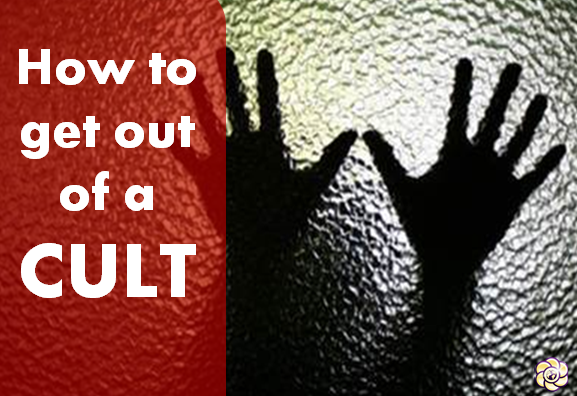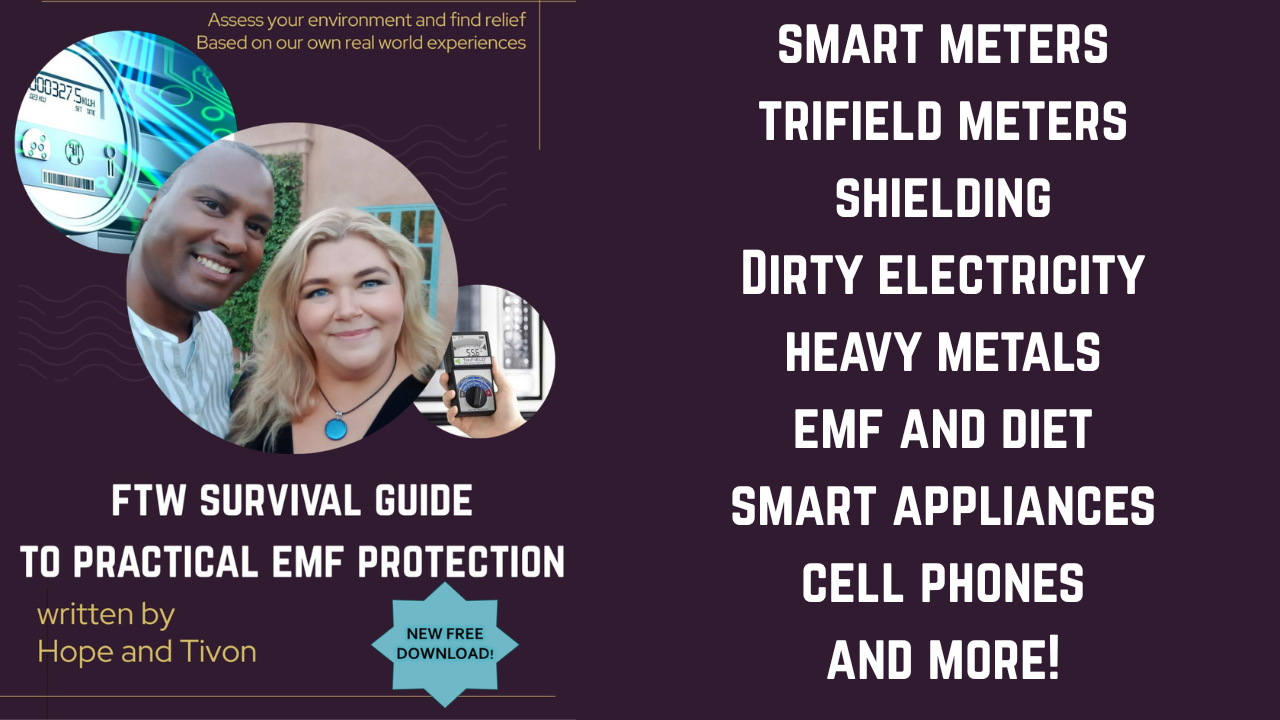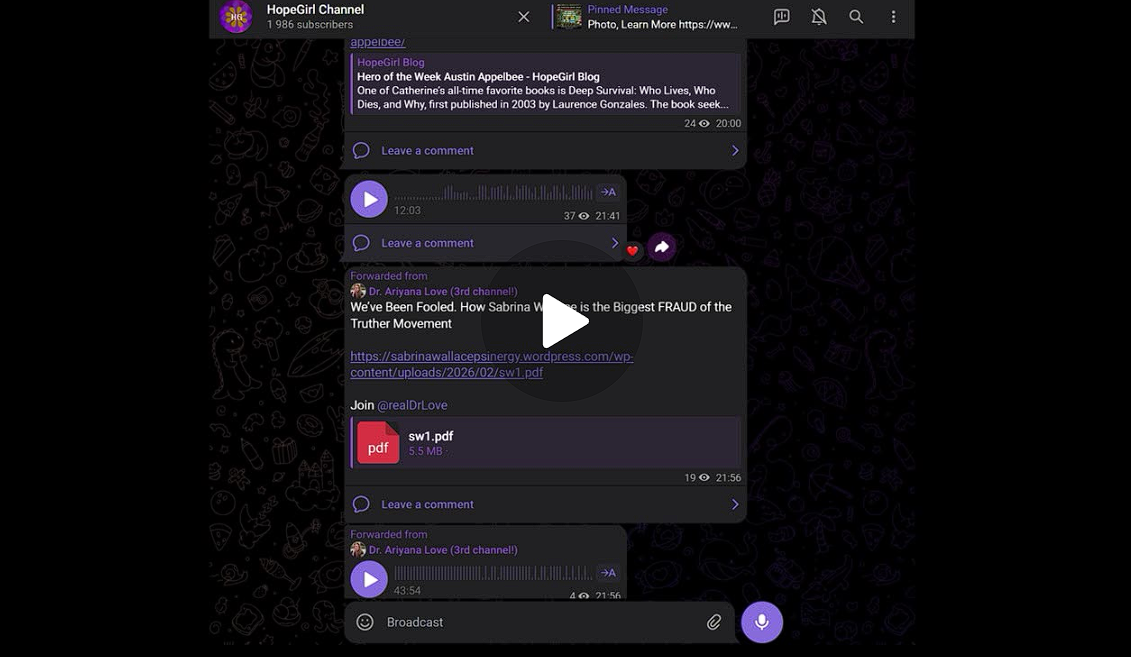How To Get Out of a Cult

I wrote this article several months ago and was waiting for the right time to post it. Having just received news of a former acquaintance what was involved in a cult and has since lost everything, I decided to post this now. This article may be tough for some to read, but its ultimate message is an attempt to bring clarity and hope to individuals that may be experiencing this. I’ve used my own experiences and the research of others on this topic to construct this article, and have added my own personal notes below. I hope it help someone who needs it. -HopeGirl
At first, it all seems so innocent and then before you know it you’ve lost almost everything and everyone that’s important to you. Cults can be defined as a system which venerates one particular individual, ideal or object. No one who is in a cult is aware that they are in one nor do they openly admit to being in one while they are in it. Cults can be dangerous and can harm the people who join them and the friends and family members that the cult initiates leave behind.
We’ve heard of infamous cults like the “Moonies”, Charles Manson, Heavens Gate, and The Peoples Temple. However there are many other cult groups that are not as easily identified as some are less severe, not fully formed, and purposely hidden from the average public.
The advent of the internet has changed the cult playing field quite a bit. The ease of access to information coupled with the desire within every human being to seek out their own feelings of spiritual awareness has left many vulnerable to the influences of cult behavior.
Reasons why someone would join a cult in the first place:
With all the problems we face in today’s world, our planet has become a ripe breeding ground for cults. People join a cult as a remedy to make them feel better from pain they have experienced in their life. People are experiencing increasing unbearable emotional pain as a result of our corrupt power structures, hence the reason why there are so many cults.
People who end up in cults may have had abusive childhoods, lack of nurturing, feelings of alienation, and pressures of perfectionism from imperfect parents. They may have had little recognition or affirmations, bad peer relationships, or were never allowed to express their emotions properly.
This kind of foundation can lead to extreme stress in the individual which impairs their judgement so they can’t see the warning signs of a cult. Then add to this repeated disappointments in one’s life in a system that sets people up to fail. This can lead to a miserable existence with a feeling of hopelessness and complete insignificance.
As a result, a spiritual search is initiated and any attention at all is welcomed. At this point, basic problem solving is too difficult and the person then feels that they need to be rescued. This increases their dependency on others, and their association with others allows for a delusional existence in an unreal world.
Common Characteristics of Cult Behavior:
“Special” claims about character, abilities, or knowledge.
Cult members believe that they have a more unique mission from god that makes them more important than the less faithful. Oftimes, self manufactured spiritual gifts are used to exploit and manipulate others.
Commonly used are special psychic abilities, “inside information”, ability to communicate with other beings etc. While such phenomenon can indeed be very real in our human personal and spiritual experience, cult leaders tend to exploit these mysteries and use them to manipulate others.
Phenomenon of “group-speak”
Followers begin to speak like the group leader, using the same phrases, tone of voice and in fact completely change the way they speak. By contrast, in safe normal groups, people retain their individuality, and unique personalities. One aspect of this is that they speak with their own phrases and tone of speech.
Other aspects are one-sided sermons, edicts, judgements and teachings that dominate the dialog and all other types of conversations cease. And used is, “Scripture as a Weapon” where verses and sayings are used to judge others and justify self.
Closed communication and isolation from the outside world
Cults normally experience isolation and a cutting off of all external ties that result in little or no contact with the outside world.
Often there is an “us versus them” group mentality that is enforced through “labeling” of other people that have different opinions. This leads to lack of intimate relationships with outsiders and intimacy with friends and family is sacrificed for the sake of the cult. Relationships are limited to only others within the group. In turn, a cult member can find themselves abandoned by family and friends who no longer wish to spend time with them due to their behavior. This leads to family deterioration as stress and distrust destroy family relationships, resulting in affairs and divorce.
In many cases, the cult members will gang up on the outsider or misbehaving member and ostracize and eliminate them as a perceived threat. This “ganging up” can be extremely painful to the victim, hence it is through fear of such events that the cult is able to maintain control over its members.
Emotional Addiction Behavior
Many cult followers are in pain, and the spiritual experience of the cult can become an intoxicating high that self medicates this pain. Each new day is a search for a new spiritual high. If ecstasy does not occur, major dissapointment is experienced and a follower will search for other types of highs to bring relief. Because of this, many cult groups also exemplify other addictive behaviors such as excessive drinking, drug abuse and illicit sexual behaviors.
Followers can become obsessed with the cults beliefs, pondering, and thinking through each belief until they are completely unable to concentrate on anything else. Eventually every aspect of one’s life becomes completely dependent on the cults belief system.
As with all addictions, with the “high’s” come the “crashes”. Resentment and anger set in as the cult members world falls apart, every one else is to blame and becomes a source of rage. Many experience deep depression as the collapse of their beliefs leads to an inability to function. Once a faith is lost, all else seems lost, stagnation sets in and the cult member is unable to do anything else but ponder past mistakes.
Deepening Denial:
Growing denial and self-justification occur as the person becomes blind to problems and tries to justify behavior. Unable to see the price being paid in ones own life, the cult member refuses to question the reality of the faith while knowing something is wrong but refuses to change beliefs. This denial makes a person unable to handle rejection. Those who reject the group are quickly discounted and cast aside to help overcome the cults feelings of rejection.
A search for “geographic cures” occur when people blame their location for their problems and always feel that they need to be somewhere else where the grass is greener. However, relocating normally just makes the problem worse because behaviors within the individual were never addressed.
In many cults there is no objective accountability. When someone is harmed, the actions are not corrected and no one takes responsibility. Instead these problems are just ignored for as long as they can be. An example of a common outcome for this behavior is financial irresponsibility that leads to personal financial collapse.
How to get out of a cult:
If you think you might be caught in a group that is exhibiting toxic cult like behaviors here are a few suggestions of things that you can do on your own to help get yourself out.
Maintain your relationships with a diverse array of people in your life.
Call your mom, go out with a friend from the other side of town, show up to your commitments. If you’ve severed all relationships, try to reach out in a gentle way and communicate with people again and ask how they are. Make new friends all the time, and socialize with many different kinds of people.
Expose yourself to a wide variety of information.
Go to meetups in different topics, read lots of books about many different subjects. Watch films and movies that are from different belief systems. Learn about the world and its different cultures and spiritual beliefs in a rounded holistic way. Always be open to hearing about something new and something different.
Maintain an interest or hobby that makes you unique.
If you have hobbies or things that you enjoy that no one else around you likes to do, make sure that you continue doing the things that you love. This will help you to maintain your own individual identity.
Do something productive.
Build something, start something creative, volunteer. Keep yourself busy by doing productive work with results you can measure.
For severe cases:
When someone has been heavily involved in cult like activity, more drastic measures may need to be taken to help bring a person back to a place of balance. Call a family member and ask for help getting out. Cut off all communications with the cult if you need to. Learn about cult recovery stages from others who have gone through this before and try to find some sort of healthy support group. And most importantly DO NOT ISOLATE YOURSELF. Getting out and meeting new people and having new experiences are vital to balancing a cult tainted perspective.
Our search for spirituality is an important aspect in our lives that should remain unique, independent, evolutional and un-sequestered. It’s an infinite universe, with infinite people and knowledge to experience. Instead of following cults or the “path less travelled”, we should go where there is no path and leave a trail.











